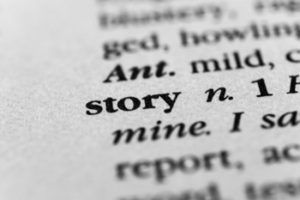
Narrative Point of View in Storytelling
Today’s post includes excerpts from What’s the Story? Building Blocks for Fiction Writing, chapter six: “Narrative Point of View.” Enjoy! The terms story and narrative can be used interchangeably, meaning a sequence of events, real or fictional, that are conveyed through any medium ranging from prose to film. However, when we talk about narrative, we’re…Read More

Literary Style in Storytelling
Today’s post includes excerpts from What’s the Story? Building Blocks for Fiction Writing, chapter five: “Narrative Style, Voice, and Tone.” Enjoy! Literary Style Literary style is the aesthetic quality of a work of literature—the distinct voice that makes each author unique. It’s the way we string words together, the rhythm of our prose, the catchphrases…Read More

Fiction Writing: The Setting of a Story
Today’s post includes excerpts from What’s the Story? Building Blocks for Fiction Writing, chapter three: “Setting.” Enjoy! Setting may not seem as critical to a story as character or plot, yet it is a core element of storytelling and for good reason. The setting of a story helps us understand where and when it takes…Read More

What is the Theme of a Story?
Today’s post includes excerpts from What’s the Story? Building Blocks for Fiction Writing, which is packed with fun lessons and engaging activities for anyone who wants to learn the basics of storytelling. This is from chapter four: “Theme.” Enjoy! What is the Theme of a Story? Theme is one of the most difficult story elements…Read More

Storytelling: What is a Plot?
Today’s post includes excerpts from What’s the Story? Building Blocks for Fiction Writing, chapter two: “Plot.” It’s a book that lays out the fundamentals of creating fictional stories, equipping you with the basic skills necessary for writing stories that engage. Enjoy! What is a Plot? A plot is a sequence of related events in a…Read More

Kill Your Darlings (for Storytellers)
Some writing tips are cryptic. When I first came across writing advice that said, “Kill your darlings,” I thought it meant we should kill off our favorite characters. That seemed ridiculous. I mean, there are situations in which a story calls for characters to die, but to make a sweeping rule that we should default…Read More

Creating Characters That Resonate
Today’s post is an excerpt from my book, What’s the Story? Building Blocks for Fiction Writing. This is from chapter one, “Characters.” Enjoy! Creating Characters We see ourselves in a story’s characters. We see people we know—people we love, people we hate, people we fear, people we admire, and people we want to emulate. We…Read More

Sneak Peek: What’s the Story? Building Blocks for Fiction Writing
Today I’m sharing a look inside my book, What’s the Story? Building Blocks for Fiction Writing. This excerpt is from the introduction; it talks about the magic of storytelling and what you can expect from the book. Enjoy! What’s the Story? What’s a story? Is it character? Plot? Conflict? Change? Why do some stories fall…Read More

How to Develop Your Best Novel Writing Ideas
Writing a novel is no small task. In fact, it’s a momentous task. Some writers spend years eking out a first draft, followed by years of revisions. And that’s before they even think about the grueling publishing process. In other words, you’re going to spend a lot of time with your novel. So you better…Read More
What Makes Iconic Characters Unforgettable?
This post contains affiliate links. Luke Skywalker was the obvious hero of Star Wars: A New Hope, so why does it seem like Han, Leia, and Darth Vader got all the attention? When I think about the characters from Star Wars, Luke is often the last one who comes to mind. It’s not that he’s…Read More



